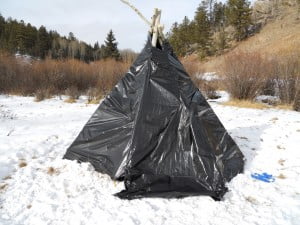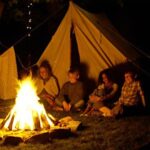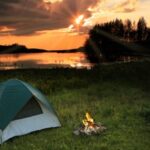by Liz Childers
You’re packing your car or stuffing gear into your camping backpack, and you realize you have too much stuff. Most campers have that moment, at some point, when they notice camping has lost its simplicity.

Jeremiah Bess had the same experience and picked up bushcrafting as a way to return to the basics. He runs a great blog Bushcraft Beginner where he records the adventures of learning bushcraft skills and putting them into practice. In our interview, Jeremiah discusses how he got involved in bushcrafting, shares stories about this learning experience, and offers tips. Enjoy the interview and check out Jeremiah’s blog!
Tell me a little bit about yourself before we begin.
I’m 34 years old, I live in Colorado Springs, CO. I’ve been in the Air Force for 8 years as a Network Security technician. I’ve been married for 12 years, and have 5 kids. I consider myself a geek, and my wife thinks of herself as a nerd. Our kids carry on that heritage as some of the geekiest nerdlets we know, they are awesome.
A tent Jeremiah built for shelter on a recent camping trip.
How did you become interested in bushcrafting?
I’d like to think my interest was bred into me. Ever since I was little, I’ve always made things with what was available, making do with what was on hand. I’m a child of the 80’s and I loved MacGyver, still do. My kids love watching it on Netflix. What draws people to that show is how Mac gets by with what he has at that time. He has very few supplies and tools on hand, and uses his knowledge to make something. See, that’s the key: knowledge. It’s been said that the more you know, the less you need to have. Knowledge is a tool, just like anything we can physically carry with us in the woods.
Growing up, we went camping as a family. It was the normal tent camping most the time, but we also did cabins once in a while. Camping was a great escape from the city life growing up in the Bay Area of California. When I got married, my wife and I started gathering our own supplies to do our own camping. Unfortunately, that list of supplies continued to grow as we got older. You eventually just can’t lay on the ground anymore like you could as a kid. Air mattresses became a necessity. With that, a rechargeable pump. Then we had to have a tent big enough for our air mattress, and any bags and supplies we didn’t want to get wet if it rained. Then with kids, we had to get a bigger tent. Then it was easier to get a second tent just for the kids. Later we thought it would be nice to have a canopy for the food prep/storage area. We got a heavy dutch oven, with all the accessories. Our most recent addition to our supplies was a camping toilet. It got to the point that we filled up the bed of my mid-size truck, and had to carefully pack everything so I could cover it with a tarp in case it rained on the way up to the mountains.
I’m not saying all these things are bad, or you are weak if you have to have some comforts when camping. Camping is supposed to be enjoyable, relaxing, calming, a vacation from home. But I started to feel like I was taking home with me when we went camping. So I started looking for something different, at least for me.
I had watched a few of the survival shows, “Man vs. Wild,” “Man, Woman, Wild,” “Dual Survival,” and “Survivorman.” I found them interesting not because they put themselves in dangerous locations in desperate situations and found a way out, but because they showed how little you really need to survive. But bushcraft isn’t about survival, though we can learn a lot from survival skills. In my opinion, bushcraft is a core of survival with a thick layer of thriving surrounding it, iced with comfort. It’s going out and connecting with nature, depending on it, learning from it, engaging with it.
How are you learning bushcraft skills?
The Internet is pretty much my only source of information. Like I said, I’m a geek. I started watching videos of Ray Mears (the king of bushcraft), “Bland County Survivorman,” “Bushcraft on Fire,” and many others. I started reading blogs like Wood Trekker, Skills for Wild Lives, etc. I even read an e-book (geek), Woodcraft by Nessmuk, which is claimed to be the bushcraft bible. The e-book is free, by the way, thanks to the Gutenberg Project. I started making lists of skills to learn, and gear to collect.
I knew that watching and reading were only going to get me so far. It’s one thing to watch a video of someone starting a bow drill fire, but another thing completely to try it yourself. I still haven’t got that one down yet. Knowledge + experience = wisdom. And sometimes experience is something that shows you how NOT to do something.
What has been the hardest part in this learning process?
Time. With my busy job, church responsibilities, and family life, getting away for a day or more can be a challenge. My wife also won’t let me go out to the woods alone. I think she thinks bushcraft is what Bear Grylls does. So I enlist a friend of mine who is interested in bushcraft as well, and we try to set up a day or so when we can get up in the mountains. So coordinating schedules causes problems too. I’ve tried working with the elm trees in my back yard for projects and fire starting, but to be honest, elm sucks at everything. Too bad, cause it grows like a weed all over my neighborhood.
What do you enjoy most about camping with bushcraft skills?
I really enjoy going out with minimal gear, and living for a spell in the awesome mountains of Colorado. This is such a beautiful state, and I’ve only seen very little of it. I like observing what things are around me, trees, shrubs, rocks, animal sign. I’ve been keeping a journal of things I find, and take pictures so I can do some research on it when I get home. But again, that time thing gets in the way sometimes with the research.
During a camping trip, Jeremiah roughed a spoon from aspen wood. Back at home he finished carving the spoon.
What tools do you use in bushcrafting?
My goal is to make knowledge my #1 tool, but who wants to chip a knife out of a rock? I might want to do it once, eventually. I found that you really don’t need much to practice bushcraft. A good knife, hatchet, and maybe a folding saw/buck saw/bow saw are energy savers. I found the joys of hammock camping last year, and have made my shelter system based around it. I have a tarp, hammock and underpad, and mummybag. I tried just my wool blanket, but it’s just too cold at the altitudes I camp at. Maybe in the heat of summer it would be alright.
I carry several methods to start fire, my favorite being a ferrocerium rod, and a good old lighter. Different tinders to carry in case I can’t find anything in nature to use, or it doesn’t work as well as I thought. I have a military canteen and metal cup, which is my cook kit. I usually carry a bunch of para-cord as well, tied up in different lengths. I have a heavy military issue camelbak backpack to put everything in and on, so I get my storage of water in that as well.
Based on what you have learned thus far, why do you think bushcraft skills are so important to have?
When it comes down to it, bushcraft skills get you back into using the land, like the pioneers did, like many primitive cultures did, and many still do. Tools, food, shelter, medicine can all be found out there in nature. Who wouldn’t enjoying carving a spoon from a log, and eating your dinner with it? How cool would it be to build an entire shelter from natural materials and sleep in it, warm and dry? Wouldn’t you be the coolest guy or gal at camp when you start a hand drill fire with just two sticks? What if these skills became a requirement to sustain life?The Boy Scout motto is “Be Prepared”. There are many who think that being prepared means stockpiling, to include guns to defend your collections.
What if a natural disaster happened here in Colorado Springs, and we were without water or electricity? I know enough now to be able to build a fire to keep my family warm, and boil some of the creek water two blocks down so we can safely drink.
What if you get lost in the woods? How would you survive? How would you find your way? These kinds of skills are very important, so much that I’ve started teaching my children. Now they go into the backyard and build shelters with the plastic slide and turtle sandbox lid. My kids even go around our house and collect rocks that have sharp edges so they can have a knife in their kit.
Do you have a story that highlights your experiences learning or using bushcraft skills?
I have a blog post in January 2012 that details the experience, but I learned a lot from this one trip. A friend from work and I took 3 days of leave and went up in the mountains into a valley near a stream. It was deep in winter, so there was 2-3 feet of snow, and the stream was frozen, but still moving under the ice. We were going to build a tepee, and spend some time exploring the area. We lasted 7 hours. The cold and wind were bitter, my boots weren’t waterproof like I thought, so my feet were freezing, and we just could not get a sustainable fire going. It was nearing dark, we had about 30 minutes left of daylight. We sat and talked about staying or leaving, and decided leaving was the best decision. It seemed like a complete failure of a trip. We got the tepee built, but never got a fire going in it so we could sleep in warmth.
So why did we leave? Because we weren’t out there to prove how macho we were fighting the cold winter of Colorado. We weren’t doing it to sustain our life, home was just an hour and a half away. We did it because we wanted to have fun. In learning anything, you will fail once in a while. But failure just teaches that you need to deal with the situation differently next time. Once it stopped being fun, and the real threat of frostbite, or hypothermia started becoming a reality, we called it quits.
Learning and practicing bushcraft should be fun. Sure, somethings are work. Building that tepee out of aspens that we fell, and dragging them in the snow was a lot of work. But it was fun, and the finished product was rewarding. The lessons I learned from that one trip will stay with me the rest of my life. If something you do to enjoy stops being a pleasure, it’s time to reassess.
What advice do you have for someone interested in learning bushcrafting?
My advice is this: learn and then do. There are tons or resources out there, on the Internet, books, and classes you can attend. But when it comes down to it, you just gotta get out there and do it. Use whatever you have available. Parks, creeks, your own backyard. It does you no good to learn all this stuff, and then be an armchair bushcrafter.
What made you decide to start your blog, Bushcraft Beginner?
My blog is just a place to journal my adventures, and things I find interesting on the subject. I’d like to hope that my posts have benefit for anyone wanting to learn bushcrafting, or are at the same place I am. I really do feel I am such a novice at this, and I may not have a lot of knowledge and wisdom to share like some others out there. But I share what I have. I welcome any comments, questions, critiques, or suggestions anyone has for my blog. It’s finally ending winter here, and I will soon have some more bushcraft adventures to blog about.



